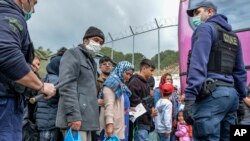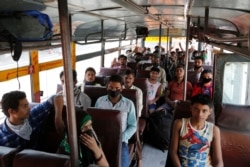The International Organization for Migration warns growing discrimination against migrants, who often are blamed for spreading the coronavirus, impede efforts to tackle the pandemic.
The coronavirus pandemic has dealt a serious blow to global migration. The International Organization for Migration reports work visas for migrants have practically come to a halt, and the resettlement of refugees and asylum seekers in third countries has been temporarily suspended.
It says thousands of migrants are stranded in Southeast Asia, Africa and Latin America because of border closures and travel restrictions. It says many migrants who want to return to countries of origin because of the pandemic are blocked and forced to live in difficult conditions with minimal care.
IOM Director General Antonio Vitorino says migrants in countries of destination too often are denied access to health care. He says this puts them in danger of becoming infected with the virus and it also endangers public health.
“At the current moment, we are confronted with the fear, the reluctance and the difficulty of access of migrants to health care,” Vitorino said. "It is not just a question of fundamental rights…it is also a question of public health; of guaranteeing that access to health care by migrants is in the interest of the entire community.”
IOM reports there are 272 million international migrants in the world. They provide an important source of income to many of the world’s most impoverished countries. Vitorino says the pandemic will have a powerful impact on the global economic recession that lies ahead and on the subsequent recovery.
He says the economic recession will lead to a dramatic drop in the remittances that migrants send back to their countries of origin.
“The World Bank forecasts a drop in remittances to Africa during the current year of 30 percent, which means $20 billion U.S. dollars will not be transferred to sustain the livelihood and the households of the families that stay in the countries of origin,” Vitorino said.
In some countries, Vitorino says remittances amount up to 15 percent of their Gross Domestic Product. He says migrants provide essential services to countries of destination. For example, he says migrants comprise 40 percent of health care workers in countries such as Britain, the United States and Canada. He notes migrant seasonal workers are essential in harvesting a nation’s agricultural crop.
Despite the key role they play in a nation’s economy, he says migrants usually do not benefit from the public safety nets of the countries in which they have settled.





